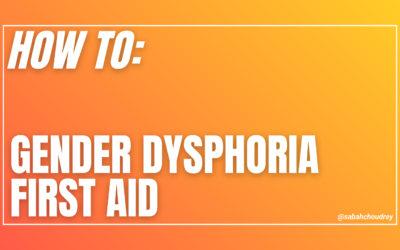“Your GP has referred you to [local clinical team]. They will help you with your mental health issues.”
This was the first line of a letter I received 1st March, after informing my GP between stutters that I want to transition. The letter itself hasn’t got anything to do with gender reassignment, it’s a standard confirmation letter that the referral has been made. Which is good news considering I only saw the doctor two weeks prior to that. However, because of the way in which the NHS (UK healthcare system) works, it will be many months before I get anywhere. After a phone call, they said that I should expect an appointment with the mental health team in June. (Despite what they say on their website about being offered an appointment within 20 days of the referral.)
“Mental health issues”, gosh, that just puts knots in my stomach. Is it, though? Is wanting to change this body a mental health issue? For some it could be. The first part of this appointment will be ruling out whether or not the desire to change gender is motivated by some sort of psychosis. Any underlying problems must be treated first. I haven’t had any serious mental health issues in the past so this part will be (should be) straight-forward for me. But then they need to make a second judgement. And that will be Code 302.85, for adolescents and adults, or gender dysphoria to you and me. These numbers tell the mental health team that we comply with:
A. A strong and persistent cross-gender identification (not merely a desire for any perceived cultural advantages of being the other sex). In adolescents and adults, the disturbance is manifested by symptoms such as a stated desire to be the other sex, frequent passing as the other sex, desire to live or be treated as the other sex, or the conviction that he or she has the typical feelings and reactions of the other sex.
B. Persistent discomfort with his or her sex or sense of inappropriateness in the gender role of that sex. In adolescents and adults, the disturbance is manifested by symptoms such as preoccupation with getting rid of primary and secondary sex characteristics (e.g., request for hormones, surgery, or other procedures to physically alter sexual characteristics to simulate the other sex) or belief that he or she was born the wrong sex.
C. The disturbance is no concurrent with a physical intersex condition.
D. The disturbance causes clinically significant distress or impairment in social, occupational, or other important areas of functioning.
The mental health team describe gender reassignment not formally as a mental health illness, but it does need specialist skills of mental health professionals to prepare the person, ultimately for surgical intervention. If any transgendered person is to receive any treatment, psychological or medical, this is the route they have to take; there’s no other way of obtaining hormone therapy and sex reassignment surgery. It seems like these are ‘guidelines’ we have to stick to and fit ourselves into, to get what we want. But it’s still implying that all those feelings, A B C and D, are part of a disorder; they’re not real. They are something to be treated.
I’m speaking for myself now. I do cross-dress, I wear men’s clothes, and sometimes I pass, although that isn’t my particular desire. I dislike it when a waitress or shopkeeper says, “Thanks love”, despite my slightly masculine, androgynous appearance. (I think it’s the way I speak that shows off my femininity.) But I would never want to be treated like a man. I would hate for someone to look at me, identify me as male, and then to expect me to behave like a man, to walk, talk, act, eat, drink, drive, like a man. So many behaviours are integrated in gender stereotypes. And this is one gender stereotype I am actively avoiding.
I see many webpages and video tutorials for early-stage FTM’s, about how to ‘pass’ as a man, to avoid being identified as a woman and as a transman. There are hundreds of tips, from dress sense, to packing, and binding. It’s the tips on mannerisms that get me wound up. Before I go any further, I would like to say that I understand that passing for some transmen (and transwomen) is part of a safety issue in the community and also, most obviously, personal preference. It’s up to you how you want to be read and whether you want to pass or not.
So, mannerisms. Gender-appropriate clothing – yes sure. Gender-appropriate haircuts – not really. Gender-appropriate behaviour – hell no.
Men speak monotonously, take up more space with their legs and arms, firm handshakes, less talking with their hands. Since women have short hairstyles too, a short hair style for a man must be very obviously masculine. Ditch pruning eyebrows and make-up, eyeliner in particular. When you behave in a feminine way, you’re seen as ‘less of a man’. So don’t behave ‘like a girl’ basically. This promotes a different standard of behaviour for men and women, and that’s just not right. It leads to misogyny. I’ll be writing about this more in my next post.
If I changed the way I acted, I wouldn’t be me anymore. It’s like changing a part of you, acting almost, playing the role of a man on a very public stage. I hate that men take up so much space and act like they dominate a seat or area where they’re standing. My hair is a little shaggy, and a lot of gay people have similar cuts. But I love my hair, it’s a characteristic of me. When a friend describes me to someone, I’m “the one with the hair”. I am very expressive with my hands and eyebrows, and that defines me, I wouldn’t want to stop that. And my eyebrows are perfect and they shape my face well. I’ve been asked if I would stop threading/plucking them when I’m on T, but the answer is an obvious no; why should I? They frame my face very well and I feel confident about myself. And confidence is the best passing tip anyone should give you.




I see it from a slightly different perspective. I’d say your current anatomy probably is causing you mental health issues as it’s not a match to your identity. Your transition is the remedy to cure those issues. The mental health issue is the disconnect between mind and body, the remedy is bringing the body in-step with the real you, which is the you that thinks and feels.
You’ve summed it up well!
I guess I don’t see it as a mental health problem because it’s not as severe as other trans people feel this disconnect.